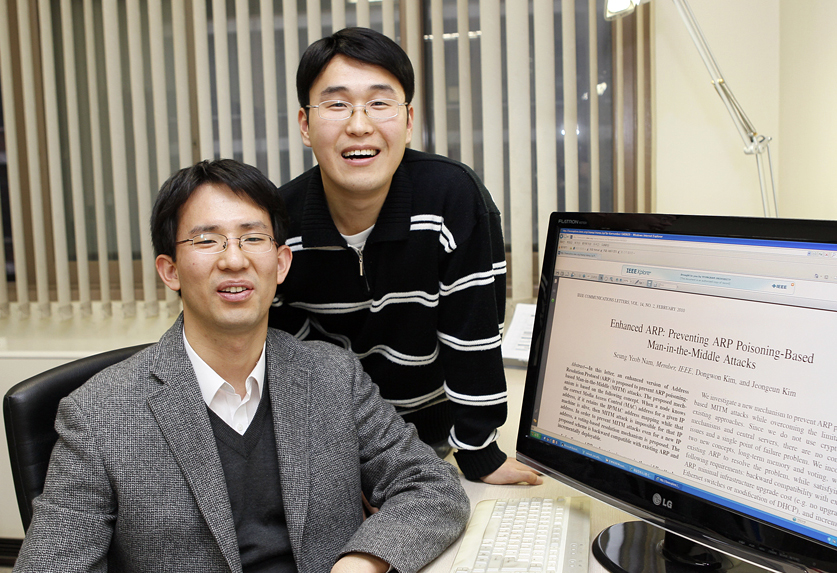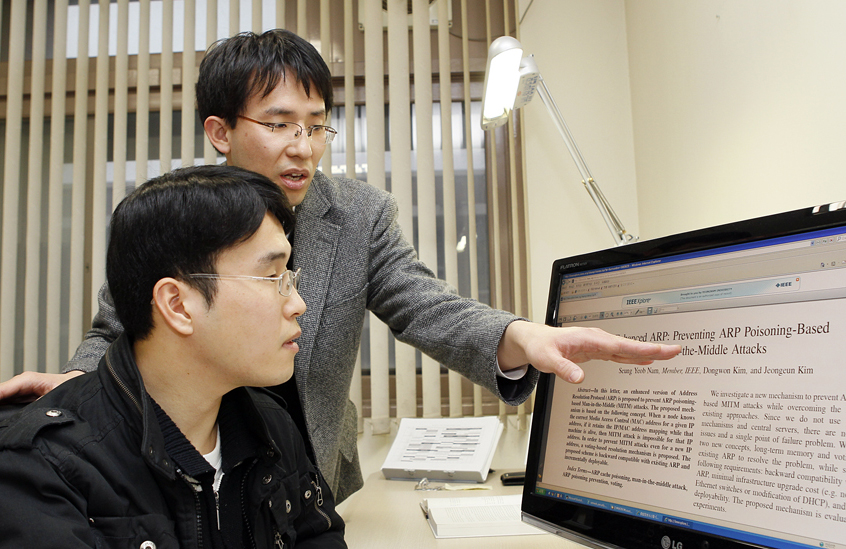Cooperation work of Kim, Dong-won (senior), Kim, Jung-eun (graduated), Nam, Seung-yeob (professor)
Presenting new plans to prevent hacking, published on IEEE academic journal
[March 10, 2010]
Graduation thesis of undergraduate student of Yeungnam University published on SCI level journal.
Kim, Dong-won (28, photo, left), who is on his second semester of his senior year in the Department of Information and Communication Engineering, and Kim, Jung-eun (28, female), who works as a researcher for LG Electronics mobile communications department mobile terminal R&D center after graduating in August of last year is in the limelight.

Their graduation thesis that presented 'Enhanced ARP: Preventing ARP Poisoning-Based Man-in-the Middle Attacks' (guidance professor Nam, Seung-yeob, photo, left) was published in the February issue of the 《IEEE Communications Letters》, which is the official journal of the IEEE, which is an international organization that is the globally most prominent institute in the electric and electronic engineering sector.
The IEEE (Institute of Electrical and Electronics Engineers) has approximately 400,000 professionals in 160 nations being active as members, and its student membership numbers to 90,000. Because it also has many theses submitted for its academic journal from around the world, it is famous for its rigorous screening theses.
Despite this, the graduation thesis of these undergraduates were able to be published in the journal because it presented a whole new approach of cooperation between users.
'ARP' is an abbreviation of 'Address Resolution Protocol' and is a protocol that changes the IP address of the host computer to a MAC address. Through cooperation between users, it presented a new concept that hacking can be prevented using ARP, and this was proven through tests.
They explained, "When existing ARP-based hacking prevention methods use certification centers based on encrypted algorithms, it is very dangerous if a center-concentrated server is hacked and falls, but this method makes decentralized administration possible, and is a very simple method that does not require encryption or certification centers."
In order to enhance the reliability of their demonstration, they conducted thousands of tests for each of the four types of attack scenarios. This not only required a lot of physical time, but also a great amount of perseverance, patience and stamina. Staying up nights at the computer lab was nothing new. Moreover, because it was an approach from a whole new perspective, there were no cases to refer to, and they had to make many trial and errors without having assurance of the conclusion, making them think about giving up several times.
However, with the encouragement and advice for test results by their guidance professor Nam, Seung-yeob (35, Department of Information and Communication Engineering), they were able to achieve 100% success rates.

Their next goal is to take the tests results that were successful in wired internet environments and apply the results to wireless internet environments.
Kim, Dong-won who is due to graduate in August explained, "With the distribution of devices used in wireless internet environments such as iPhones and iPads, hacking methods are becoming more intelligent and more various, and its range of damage is also growing," and stated his hopes saying "I hope to develop security methods that can be easily utilized by anybody in order to prevent the side effects of the digital era, while improving its intended functions."











